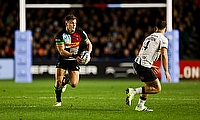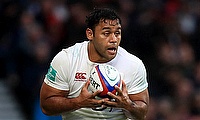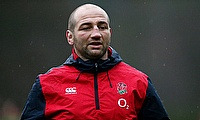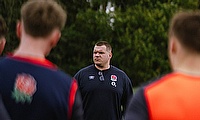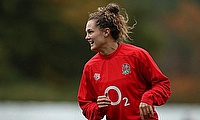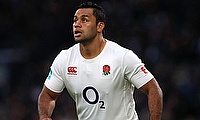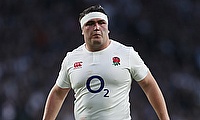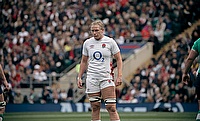Rob Andrew, Mr Indispensable
Wednesday 7 December 2011

Rob Andrew, Mr Indispensable
Last week saw the announcement that Rugby Football Union chief executive Martyn Thomas would be stepping down from his post at English rugby's headquarters with immediate effect.
The move sees Stephen Brown take over the role in an interim capacity with Thomas having brought his departure forward.
The former RFU chairman's departure also sees him leave his post as chairman of the organising committee for the 2015 World Cup, to be host in England.
Thomas' departure from the RFU had been touted back in September but survived a vote of no confidence in September after threatening legal action over the publication of Jeff Blackett's report into the exit of predecessor John Steele.
In the wake of England's World Cup campaign in New Zealand that was not only a disaster on the pitch but a public relations nightmare off it, Thomas' departure is the third in what is promised to be a radical shake-up at the RFU.
A few weeks ago saw the resignation of Martin Johnson as England manager after three-and-a-half years in the role was announced and I for one expected Andrew to follow suit if not with immediate effect then at least after a short while of contemplation.
Many commentators fully expected Andrew to do what can only be described as 'the decent thing' and fall upon his sword but it appears that the former England fly-half and Newcastle Falcons director of rugby is taking some time in deciding exactly which sword he shall fall on. Excalibur or Godric Gryffindor's perhaps, it appears that Andrew is still undecided.
Andrew's credentials for the role of Director of Elite Rugby, or whatever the title is this week, cannot be doubted. Eddie Butler's piece for the Observer online puts much of the revolution of rugby into the professional era down to Rob Andrew's plan of 2000. At the time Andrew was seen to be at the cutting edge of rugby.
It would appear now however that Rob Andrew, like many in the boardroom at the RFU, is now stuck in the dark ages. During his tenure at the RFU, since 2008 Andrew has overseen the departure of three managers thus prompting him to be dubbed 'rugby's Teflon Don'.
It was Andrew who was tasked with the job of replacing Brian Ashton in 2008, a coach who had overseen one of England's more bizarre World Cup campaigns - defying all form in order to reach the final.
Johnson was to be the man to change England's fortunes, a former England captain lacking any coaching experience made up for in spades by his talismanic status among players and officials at the RFU.
The Johnson regime did not begin well, unable to travel on the tour to New Zealand Andrew took his place and as is seemingly the case for England in that part of the world that visit was blighted by scandal, scandal which to this day has never been unearthed.
It is by Andrew's own admission that in his role as director of elite rugby that "four-fifths are very good" in what he describes as "a big department". With that in mind I can't help but agree with former England hooker Phil Greening's views on Andrew in his elite director capacity. Greening, now London Welsh coach claimed: "What is key is that Rob Andrew steps aside from his elite role and does the other four or five jobs he says he does and concentrates on that. Perhaps it is time that Andrew just stuck to what appears he is best at because dealing with the affairs of the England team no longer appears to be his forte.
Two weeks ago Rob Andrew admitted to BBC Sport that English rugby had hit "rock bottom following the leaked reports into their World Cup failure in an interview in which the former England fly-half reiterated that he would not resign.
Responsibility was accepted for what had gone on and yet no resignation appears forthcoming. Andrew also admitted that in hindsight he could have taken a prominent role is assisting now former manager Martin Johnson when disciplinary issues arose. Hell, representatives of the RFU having actually flown to New Zealand to act as support network for Johnson would have been a great help.
There can be no hiding from the fact that the RFU is in a shocking state both at bored and pitch level but we are assured by Mr Andrew that he has many irons in the fire, so to speak, when it comes to the appointment of a new head coach. For the time being however it is understood that an interim head coach will be in charge for the Six Nations, likely to be Stuart Lancaster, and in light of off-field issues dogging England's Rugby World Cup campaign a senior team management position will be created. This role will entail the handling of the national side's non-playing matters, a baby-sitter in essence. Andrew claimed: "I have Plan A, B and C but we have to get the appointment right for the long term. Personally I would prefer him to be English but it has to be the best guy to take us forward to 2015 .
As much as I commend Andrew's sincerity and the work that he does in the four-fifths of the department that appears to be successful changes not only in terms of a head coach or manager but the role of Elite Director either needs to be made redundant or a new one needs to be found. The buck has to stop somewhere and it in my opinion must lay at the door of Rob Andrew. It is inconceivable that in any other sporting organisation a senior official can take full responsibility for the failings of said organisation by their own admission and either not walk from the job or be made to jump.
It is my belief that the RFU, before any restructuring process takes place in earnest, carry out a vote of confidence over whether Rob Andrew should a) stay in his job as Elite Director or b) play a role as a senior figure within the offices at Twickenham. This vote would not only involve RFU board members but also chief executives of all 12 Premiership clubs. The chances of this are slim and the likelihood of Rob Andrew still finding himself in a job come the New Year very high for a man who appears, from the outside, to be indispensible to English rugby.


